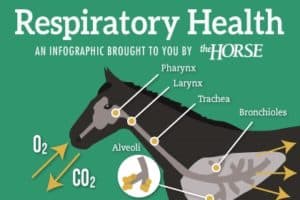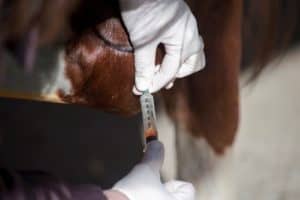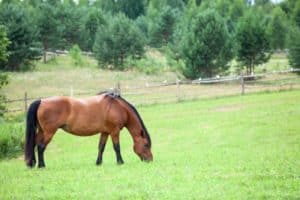Latest News – The Horse

Infographic: Respiratory Health
Respiratory-related health conditions are the second leading cause of poor performance in athletic horses. Learn more about equine respiratory health with this easy-to-follow visual guide.
AVA Responds to NSW Court Decision on Vet Licensing
The Australian Veterinary Association (AVA) believes that a recent decision by the Supreme Court of New South Wales (NSW), allowing Racing NSW to license veterinarians in Thoroughbred racing, will be detrimental to the sport.
Lecture on Equine Neurologic Diseases Scheduled at Penn Vet
The presentation will focus on equine neurologic diseases, which can range from a drooping eyelid, to a change in personality, to an inability to stand.

Blood-Contaminated Joint Fluid Samples Might Still be Useful
Collecting synovial fluid can be a tricky procedure, however, and can result in a blood-contaminated sample. While veterinarians have historically tossed such samples and started over, researchers now believe useful information can still be garnered.
N.C. Horse Shooter Sought
North Carolina law enforcement authorities hope the public can help find whoever is responsible for shooting and killing a horse while it grazed in its Wake County pasture.

Spring Pasture Management Do’s and Don’ts
After a long, cold winter in much of the United States, many farms and their fields will need some work come spring. The following guidelines will help ensure your pasture management efforts are both beneficial and economical for your farm.
UK Graduate Student Spotlight: John E. Eberth
Eberth’s research uncovered four mutations in the gene aggrecan (the major structural protein of cartilage) that are associated with dwarfism in the Miniature Horse.

Blister Beetles
Blister Beetles naturally contain and secrete a chemical substance called cantharidin, which is extremely toxic to horses. Dr. Sarah Reuss lists the dangers of blister beetles and what horse owners can do to prevent their horse from ingesting them.

Conn. Court Decides on Horses’ Propensity to Cause Harm
The Connecticut Supreme Court skirted the issue of whether horses are by nature a vicious species, ruling instead that horse owners and keepers have “a duty to take reasonable steps to prevent injuries.”

Additional EHV-1 Cases Confirmed in Minnesota, Wisconsin
Since March 7 at least eight horses have presented with acute neurologic disease. Of these, six horses have tested positive for the EHV-1 virus.

Graham Motion and Buck Davidson Team Up for UK Lecture
H. Graham Motion and Bruce “Buck” Davidson Jr. will speak April 21 at 6 p.m. in the Ag Science Building’s Seay Auditorium on the University of Kentucky campus.

Optimizing the Care and Management of Your Equine Athlete
Health is a state of complete physical, mental, and social well-being, not merely the absence of disease. Here’s how to keep your equine athlete happy, healthy, and at the top of his game.

First UK Equine Research Crowdfunding Project Raises $6,000
The crowdfunding project, which ended on March 10, is possibly the first such effort in the veterinary science field.
Gluck Foundation Releases Fifth Research Report
The Research Report 2013 focuses on the UK Maxwell H. Gluck Equine Research Center faculty’s research accomplishments and scientific publications during the 2013 calendar year.
Staying Found (Even When You Feel Lost)
Not long ago, a group of trail riders got themselves lost in the Badlands Wilderness Area in Central Oregon. Luckily, they had working cellphone and

Determining Personality
How can a horse purchaser check out elements of a horse’s character at the purchase exam?











